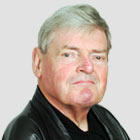People are drifting into a lethal slumber on climate change. More of the same won't wake them up
It's an exceptionally inconvenient truth. Only one American in three believes that human beings are responsible for climate change: a polling result 10% down on where opinion rested the year before. Worse, the number of Americans who believe that climate change is a hoax or a scientific conspiracy – not doubting, just damned blank certain – has doubled since 2008. Add in those who assert that the changes, if any, are of "no significant concern", and you've got 30% of the US denying, scoffing and just walking on by.
Are the issues clearer, the people more committed, here in Britain? Call for the latest evidence from Ipsos Mori – and find that the proportion of UK adults who believe that global warming is "definitely" a reality has plummeted from 44% to 31% in the last 12 months. Figures like these, on both sides of the Atlantic, are getting more sceptical week by week. The real change of electoral climate is that fewer and fewer voters pay any heed to scientists and politicians.
It isn't hard to collate the factors that drive disillusion. Professors with a colloquial touch writing "awful" emails; a recession so tough that it blows future shock away; a cold, cold winter the Met Office didn't forecast; scientific angst about swine flu revealed as way over the top; dodgy figures, dodgy reporting, dodgy issues way up to UN level.
These are only a few of our least favourite things. Mix them together in the stew of pre-election politics, and the result is lethal inertia. Once upon a quite recent time, David Cameron seemed bent on playing a new green giant. Now he's just another family-friendly campaigner, keen on pressing pounds sterling into sweaty palms. Environmental issues have slithered down the greasy pole of public anxiety. They won't get much of a mention on the hustings in May: no fresh commitments, no crucial pledges. In one sense, the heat may by rising; in another, the heat is off.
And that, of course, is cause for very significant concern. Democracies move in particular ways. Voters have to clamber on board when sacrifices are required. They have to see the need for pain, to sense the danger of doing nothing. They have to lead their leaders as well as follow – once they switch off, nothing good happens easily, if at all.
An Obama stalled on healthcare reform in the Senate isn't going to be able to deliver sweeping global warming policies. He may not be George Bush, but he already seems to know when he's on a loser. And, without him, you can write the Chinese or Indian scripts. You can tell that the follow-ups to Copenhagen will be feebler, not stronger: true cause for despair. Kick away any mass impetus for tackling climate change as schedules of imminent necessity fade and review panels plod across the wastelands of borrowed time.
What's to be done (except wait for a natural disaster that ends all argument – and much else besides)? First, through gritted teeth, say what won't work, what's been tried already and failed.
More jaw and Gore from politicians can't cut it. They have come to seem secondhand sources, merely parroting a frail scientific thesis. That goes, alas, for journalists, too – and for pressure groups issuing lurid warnings or staging angry demos. Those of us who are convinced, who believe in the necessity of action, haven't changed our minds. But we're not the point. The audience that matters is out there, sleeping or drifting. And rousing it will demand something different, not more of the same.
Yet more of the same is exactly what we seem to be getting. More re-examinations of existing evidence, monitored by the people who failed to monitor it last time. More supposedly transparent attempts to say precisely when Himalayan glaciers will melt. More United Nations panels, flying lugubriously hither and yon in the cause of consensus. More declarations signed by hundreds of scientists on behalf of a notional "scientific community" (rather like letters to editors from umpteen economists urging cuts or no cuts).
None of it has a ring of renewed confidence. And the plain fact is that we surely need a prophet, not yet another committee. We need one passionate, persuasive scientist who can connect and convince – not because he preaches apocalypse in gory detail, but in simple, overwhelming terms. We need to be taught to believe by a true believer in a world where belief is the fatal, missing ingredient.

















































No comments:
Post a Comment